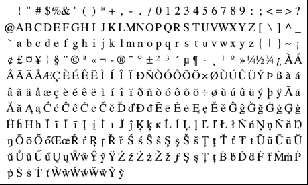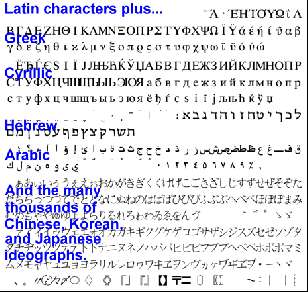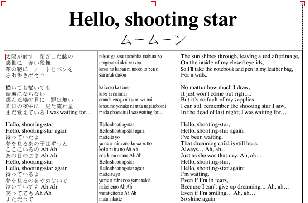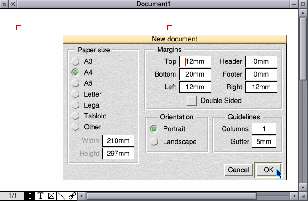Rick's b.log - 2015/11/13
You are 3.129.23.30, pleased to meet you!
Rick's b.log - 2015/11/13 |
|
| It is the 4th of May 2024 You are 3.129.23.30, pleased to meet you! |
|
mailto: blog -at- heyrick -dot- eu
In a similar manner, you won't get French and Japanese on-screen together. Why? Because French apps will be using (and expecting) Latin1, and to render Japanese you'd normally need to be in the UTF-8 "alphabet", but in UTF-8 all the high-bit-set characters will be interpreted as UTF-8 so all those French accents will disappear. Even worse, you'd likely need to jump through some hoops in order to work out what the current alphabet is; and realise that the user can change this at any time and the system won't notify you of this change. Duh.
Again, it isn't that the FontManager can't handle it, it is that we're stuck with an API from the '80s.
To this end, I have been making some experimental tweaks to Ovation which, so far, seem to be coming out rather nicely. The beginnings of provision of UTF-8 support. Regardless of what language your machine thinks it speaks. Because, really, it is reprehensible that a dirt-cheap MP3 player can talk in Chinese and Korean and a desktop publisher can't.
At the moment, this mode is all-or-nothing. If you start Ovation normally you will get a regular (Latin1 or whatever the OS is) version of Ovation.
You can confirm this by looking in the Info window (iconbar menu, then follow Info arrow):
Once you have loaded Ovation in UTF-8 mode, you can make use of extended characters. Note that you may experience "issues" actually typing them, as unless your computer is also in UTF8 mode, it'll be throwing LatinX characters at you. This is something that will need to be resolved, but not today.
It gets better. The standard fonts contain support for characters that you may be likely to need for Latin-based European languages. Here's Trinity.Medium's repertoire:
But wait, we can do better yet. If you have a suitable Unicode font (such as Cyberbit), much more of the world opens up:
Meaning, this is possible:
Be aware, though, that if you do not have Martin Würthner's PostScript3 driver, you won't be able to create PDFs. This is because the standard (Acorn era) PostScript2 driver is crap and outputs rubbish when in UTF-8 mode. Printing to image-based printers (dot matrix, inkjet, laserjet) should work without problems.
Also in this release are nicer high-resolution sprites and improves Templates designed by Matthew Harris - thanks very much for these improvements. Take a look, and note the Link tool now looks like a link:
So, here's the What's New text:
And, finally, here are the all-important downloads:
If you want a play (requires the Cyberbit font and a Unicode capable version of RISC OS):
Ovation v1.52 - nicer looking and some Unicode
RISC OS has poor support for anything that isn't English. On the face of it, RISC OS is capable of the usual selection of Western European languages as defined by the ISO 8859/1 character set and is also capable of other 8859/something character sets to support Slavic and such. But in an arrangement reminiscent of the old DOS codepages, what if you want to have French and Slavic on screen at the same time?
The short answer is...you can't. Not without specially written software. Different character sets required. The command *Alphabet can switch between them, but it is an all or nothing. The system is Latin1 or it is LatinX.
However, if you start Ovation while holding the Right Alt key, it will start up in UTF-8 mode.





2015/11/12 v1.52RM
* Changed scroll bar sizes to better fit into new style of icon design. It is
hardwired to "38" (OS units) on older machines, and reads the information from
the Wimp on RISC OS 4 or later.
* Added some nice new high-res sprites and Style Guide friendly templates, with
many MANY thanks to Matthew Harris for these.
* The sprite loader now looks at the size of the sprite file and allocates that
much, instead of being hardwired to some arbitrary value.
* There is a hack to run Ovation in UTF-8 mode. Simply start the application
whilst holding down the Right Alt key.
This is a simple hack (specifies UTF-8 font encodings) which has "problems"
at the moment, namely:
-> Input of accented (and other high bit set) characters is not possible
except when machine is itself in UTF-8 mode.
-> UTF-8 state is not stored in any files. Either Ovation starts that way
or it doesn't. [you can run multiple copies, in one of each way]
This is just a test. It may be extended to resolve some of the above issues,
or it may be forgotten about.
You can tell which mode a copy of Ovation is running in by looking in the
Info window. In UTF-8 mode, you will see "[UTF-8]" suffixed to the version.
2015/11/13 v1.52RM *released*
* Cursor movement now works correctly in UTF-8 mode. ;-)
* Ovation can now link to DADebug if it is running on the system; simply use
debug() as a clone of printf() [max. 256 characters after any expansion];
and then *DADPrint in a taskwindow to view the output.
(this should be a complete, self contained, version of Ovation; tested on my Pi...)
(note that this version of the source builds as a DDE application from a MakeFile; it is a bit different to David's original code)
(Japanese, Romaji, and translation - copied from http://www.lyrical-nonsense.com/lyrics/moumoon/hello-shooting-star/ to make a one-page printable document)
No comments yet...
| © 2015 Rick Murray |
This web page is licenced for your personal, private, non-commercial use only. No automated processing by advertising systems is permitted. RIPA notice: No consent is given for interception of page transmission. |